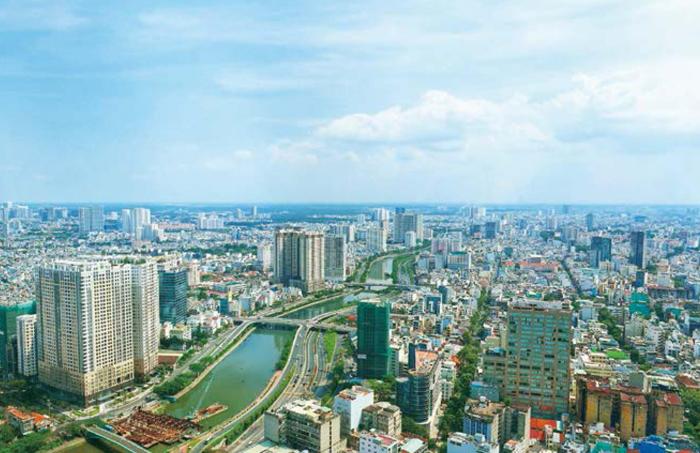空气污染下,越南经济该何去何从?
2020-07-30唐南渡
唐南渡

近年来,越南经济发展突飞猛进,已经成为东南亚经济增长速度最快的国家,但随之而来的是日益严重的环境污染问题。在越南胡志明和河內甚至长期出现雾霾现象,空气污染指数已经达到了会影响人体健康的等级,情况不容乐观,这两市已身处东南亚污染最严重城市的排行榜之列。
细颗粒物(PM2.5)是越南最令人忧心的大气污染物。2019年,河内只有8天的PM2.5含量低于国家标准。胡志明市的空气质量也堪忧,只有36天低于国家标准。其他时候,这些城市数以千万的人口都暴露在严重污染的空气中。
细颗粒物对人体健康危害特别大,它们可以深入肺部和心血管系统,导致中风、心脏病、肺癌、慢性阻塞性肺病和呼吸道感染等疾病。在每年冬春季节空气污染周期中,越南呼吸道病患大量增加。
据统计,越南死亡率最高的十大疾病中,有6种与空气污染引发的呼吸道疾病有关。平均而言,空气质量低于世界卫生组织的标准会使预期寿命缩短1年,每年造成的损失约占GDP的5%。越南每年因空气污染导致的医疗支出等直接费用和劳动生产率下降等间接费用造成的经济损失约百亿美元。那么,越南应如何作为才能否摆脱“先发展、后治理”的怪圈?
污染源头何在?
造成空气污染的原因是多样的,交通是造成这种污染的主要原因之一。越南是继印度、中国和印尼后,摩托车购买量最多的国家,但国内却没有相关的验车排气制度。目前,越南有360万辆汽车和5800万辆摩托车,主要集中在大城市。其中很多是老旧车辆,排放控制技术有限。它们造成日常交通堵塞,并排放大量空气污染物,有许多旧公共汽车和摩托车排放的黑烟明显可见。
同时,不合理的城市规划加剧了越南的交通问题。市中心的高层建筑如雨后春笋般涌现,每一栋都有数千居民,给已经超载的道路基础设施带来巨大压力。除了尚且可行的公交车队外,没有任何公共交通系统。在大城市里,空旷绿地的存在被视为一种奢侈。
另一个原因是商业和住宅建筑工地的灰尘。成千上万的建筑工地遍布满载沙子和水泥的卡车,造成了永久性的沙尘暴。城市内部的旧工业场地和污染空气的设施,如煤炭发电厂、水泥和钢铁制造厂,使空气污染恶化。数以万计的城市居民使用的固体生物质炊具以及河内城郊收割后的秸秆燃烧,对空气造成了严重污染,在10月至2月的旱季尤为严重。当今的生活垃圾管理仍然有限,固体垃圾多以填埋为主,不能保障卫生。
如何拨开雾霾见天日?
环保部门已经制定了短期解决方案,包括对新车排放标准进行更严格的规定,改善交通管制,对建筑工地和运输卡车实施粉尘管理措施,加强对工业排放的监测,禁止城市使用木炭炉。虽然这些措施可能帮助解决越南部分污染问题,但并非长久之计。
第一,政府应改善和加强城市规划将大大减少空气污染。河内和胡志明市拥有大量的高层建筑,目前需要留出更多的开阔绿色空间。政府办公楼、大学和医院等人口稠密的设施可以迁移到郊区,如搬迁朗东灯泡厂等老工业区可以减少有害的空气污染物。此外,应尽快建成公共交通系统以及开发新系统,实施绿色建筑规范和电网回购,促进节能和太阳能建筑的发展。
第二,鼓励使用新能源汽车可以减少空气污染。为旧车交易提供补贴,对新车实行高税收可以鼓励淘汰陈旧和污染严重的车辆。这还将有助于解决分配效应问题,因为旧车车主往往来自低收入家庭。政府还可以出台扶持政策来推广电动汽车,比如只允许在市中心地区使用电动汽车,并降低电动汽车制造商的所得税,使其价格更实惠。
第三,考虑到污染者付费的原则,政府对污染物的定价应合情合理。修订环境保护税收条例以更好地针对柴油和煤炭等污染燃料征税。进行碳定价有利于减少碳基产品的消费和生产,促进低碳经济,缓解空气污染和气候变化,二者长期影响着越南经济和社会安全。
第四,平稳有效过渡到可再生电力系统有助于缓解空气污染和气候变化。太阳能和风能的电网回购和反向拍卖等扶持政策,将保持近期太阳能发电热潮的势头,这让越南成为东南亚太阳能发电安装的第一大国。鉴于在太阳能、风能和河外水力发电方面的巨大潜力,越南可能会制定更为雄心勃勃的可再生能源目标。
最后,化石燃料补贴改革不仅可以减少污染燃料的使用,还可以把每年空余的6.12亿美元(相当于越南国内生产总值的0.3%)化石燃料补贴用于卫生、教育和环境保护等其他福利活动。
现在正是通过修订《环境保护法》优先考虑这些潜在措施的时候。该法计划于2020年底由国民议会批准,相信政府通过审慎监管,定能扭转越南的污染问题。
·来源:《东亚论坛》
·编译:陈志莹
A recent World Bank report on the impacts of COVID-19 provides sobering reading for the region. It states that “significant economic pain seems unavoidable in all countries”.
Indonesias finance minister has said the best-case scenario for Indonesia is 2.3% economic growth, the lowest in 21 years. The worst case was for the economy to contract by 0.4%.
While an economic slowdown seems unavoidable, this is a window to leverage the power of the internet and accelerate the pace of digitalization to help mitigate risks. Indonesias digital economy, the largest in Southeast Asia, is valued at US$ 40 billion. By 2025, the number could reach US$ 133 billion, a leap from just US$ 8 billion five years ago. Maintaining this growth trajectory will be crucial to help enable a rapid economic rebound when the pandemic threat is over.
The path to that growth is a balanced and proportionate policy and regulatory environment that takes a long-term view.
The national E-commerce policy, GR80, will play a crucial role across Indonesias economy and society. The plan is for a comprehensive framework designed to regulate E-commerce, define E-commerce services and develop regulatory and licensing requirements for E-commerce providers. The policy also outlines the responsibilities of providers in areas such as consumer rights, payments, advertising and dispute resolution.
A recent digital economy report highlighted online travel, ride-hailing and E-commerce as the brightest lights behind Indonesias internet economy. Indonesian E-commerce itself is forecast to reach US$ 21 billion in total value this year, or 52% of Indonesias current US$ 40 billion digital economy. By 2025, E-commerce is anticipated to comprise two-thirds of the countrys digital economy.
Indonesias young, growing and digitally savvy population has among the worlds highest social media and mobile-usage growth rates, which are critical drivers of E-commerce adoption. Underpinning this growth are Indonesians micro, small and medium enterprises (MSMEs). These enterprises are crucial to the economy, and they also comprise virtually all online sellers. They have helped improve socio-economic outcomes for millions of Indonesians and have created new markets domestically and abroad.
A platform like Tokopedia has over 7 million digitized microbusinesses operating across its platform; 86.5% are first-time entrepreneurs, and no matter the location across the vast archipelago, the marketplace is no longer the confines of their desa (village).
Government initiatives to digitize MSMEs are well underway, but more must be done to ensure E-commerce policy can enable the sectors full potential. The government is right to drive this. However, the current approach outlined in the regulation could hurt investment, undermine competition, stifle growth and lead to less choice and higher costs for Indonesian consumers.
Implementation regulations for GR80 are currently being drafted. Vital areas need resolving to enable E-commerce to unlock opportunity and growth.
Indonesias E-commerce sector is at a nascent stage, with expenditure a relatively low 3% of total retail, compared to 16% for China and 12% for the United States. To capture this significant value, Indonesian MSMEs need simple and clear rules. These rules should be applied consistently and not create additional burdens that could restrict the ability for MSMEs to scale operations and trade.
GR80 mandates such as having global players establish a physical in-country presence will serve as a market access barrier. Local consumers and businesses will face limited choice and increased costs if international companies are forced to limit their offerings to Indonesians as a result of these requirements.
A premature tax burden will disproportionately impact MSMEs who rely on E-commerce to reach new customers, suppliers and markets. It may also push local sellers back into informal channels, inhibiting their growth and hence likely reducing the future tax base. Guidance from international organizations like the Organization for Economic Cooperation and Development (OECD), whose proposals on digital economy taxation are due at the end of 2020, will ensure Indonesia is at pace with global economies.
An inclusive, fair and transparent approach, in alignment with other sectoral regulations, will ensure all businesses can participate in global export and trade opportunities. An increased burden at a country level will make it more difficult for Indonesian companies to export, and for global innovations and services to be imported.
Cross-border data flow is core to global business and supply chains. Restrictions proposed by GR80 would remove the ease of doing business and deter investments into the development of high-value digital products in-country. These restrictions will also thwart the competitiveness of Indonesias unicorns in the global playing field and cripple start-ups trying to internationalize.
Productivity and growth will also suffer if local companies cant leverage technology like cloud-powered software, data analytics and artificial intelligence, which require data flow for processing.
E-commerce comprises diverse businesses models and sectors. The significant growth forecast for Indonesias digital economy is not the exclusive preserve of unicorns and E-commerce start-ups. Farmers looking to sell overseas, hotels managing bookings, sole traders banking online and a myriad of other transactions rely upon and interact with the digital economy.
The intention behind GR80 is right. How it is currently structured can and should be urgently improved. The implications of implementing the GR80 framework without wide stakeholder consultation will likely create barriers for MSMEs trying to digitalize and innovate in this difficult time. Inclusive feedback from domestic and foreign players will help future-proof Indonesian E-commerce.
That significance is underlined by President Joko Widodos ambition to make Indonesia ASEANs digital powerhouse. To that end, national digital policies must be practical, give consumers more choice and control, create an even playing field and align with international best practices and standards.
Indonesia will rebound more robust than ever. Making the right policy decisions now, in times of crisis, will be crucial for both the speed of the recovery and Indonesias long-term prosperity alike.
· Source: The Jakarta Post
